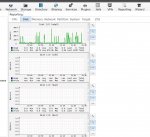Hello all, not sure if i have the right category for this but I wanted to post something in regards to my boot devices always eventually becoming corrupt. I am a light FreeNAS user with some basic knowledge and have used FreeNAS now for about 6 years and periodically keep up with the updates.
I have this nagging problem that is really irritating and is scaring me a little. Over the past 6 years my boot devices have become corrupt usually after on a reboot. I can't figure out why this is happening and am dumbfounded to find a solution. The latest and current corruption i received and error (device destroyed). I don't have a record of all the errors that were spit out over the years although i can say that each time i have researched whatever error it came back with it was always related to the boot device in some way and when i connect the boot device to other computers there is always some kind of message stating that the drive is screwed up.
1st install (didn't know what i was doing) - Sata to Spinning disk 2.5 WD drive
2nd Install Sata to CF card adapter - This was a miserable failure, CF card went corrupt after just a few months
3rd Try Sata to SSD - Eventually the SSD went corrupt and didn't boot
4th try USB jump drive - Eventually went corrupt
5th try high quality USB drive - Eventually went corrupt (today)
so for my 6th attempt i have no idea what to do. What am I doing wrong? i am not using cheap parts and I can't understand what is taxing the boot device so much that no matter what i connect or how i connect a storage device my boot device always burns out and doesn't seem to last very long. Any thoughts? Thank God importing my volume each time has worked flawlessly (kudos to FreeNAS team for that!) I'm worried i may not be so lucky next time and i will loose everything!
Thank you
AsRock Rack E3C224D41-14S
Intel XEON E3-1220v3 3.1GHz 8MB Cache LGA1150
Intel SSD 530 120GB Cache
6 x 2TB WD Blacks
I have this nagging problem that is really irritating and is scaring me a little. Over the past 6 years my boot devices have become corrupt usually after on a reboot. I can't figure out why this is happening and am dumbfounded to find a solution. The latest and current corruption i received and error (device destroyed). I don't have a record of all the errors that were spit out over the years although i can say that each time i have researched whatever error it came back with it was always related to the boot device in some way and when i connect the boot device to other computers there is always some kind of message stating that the drive is screwed up.
1st install (didn't know what i was doing) - Sata to Spinning disk 2.5 WD drive
2nd Install Sata to CF card adapter - This was a miserable failure, CF card went corrupt after just a few months
3rd Try Sata to SSD - Eventually the SSD went corrupt and didn't boot
4th try USB jump drive - Eventually went corrupt
5th try high quality USB drive - Eventually went corrupt (today)
so for my 6th attempt i have no idea what to do. What am I doing wrong? i am not using cheap parts and I can't understand what is taxing the boot device so much that no matter what i connect or how i connect a storage device my boot device always burns out and doesn't seem to last very long. Any thoughts? Thank God importing my volume each time has worked flawlessly (kudos to FreeNAS team for that!) I'm worried i may not be so lucky next time and i will loose everything!
Thank you
AsRock Rack E3C224D41-14S
Intel XEON E3-1220v3 3.1GHz 8MB Cache LGA1150
Intel SSD 530 120GB Cache
6 x 2TB WD Blacks
Last edited by a moderator:

